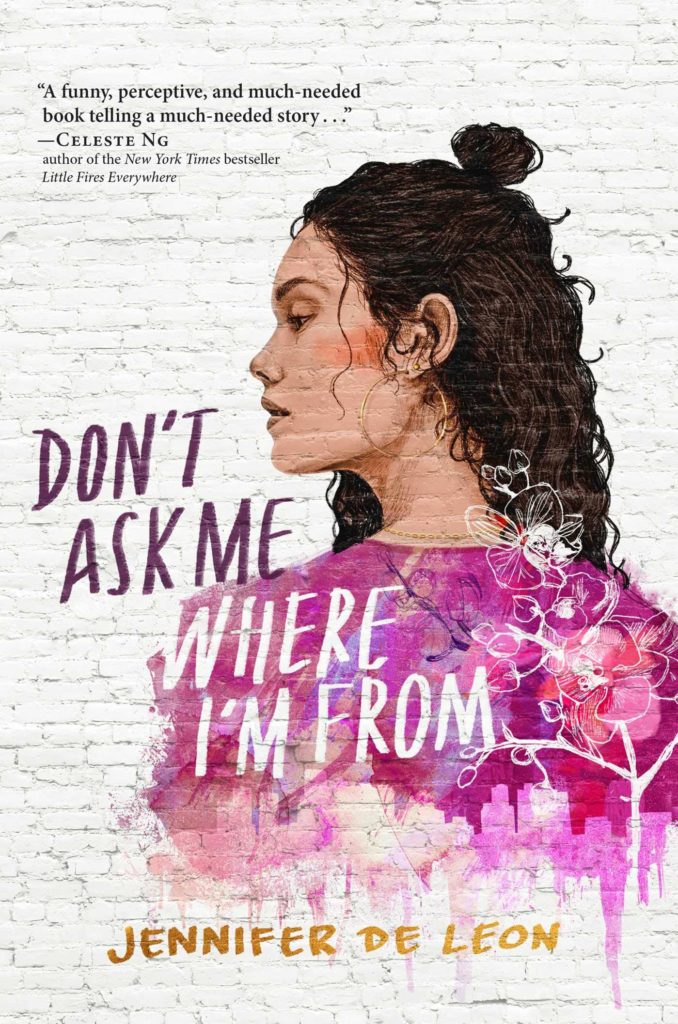Don’t Ask Me Where I’m From is a timely book which focuses on many issues that POC teens are facing today. It’s a book that is emotional on so many levels as Liliana is faced with a challenge of (re)invention while also struggling with her own family issues. Keep reading this book review of Don’t Ask Me Where I’m From to find out how I related to this book.
Summary
Fifteen-year-old Liliana is fine, thank you very much. It’s fine that her best friend, Jade, is all caught up in her new boyfriend lately. It’s fine that her inner-city high school is disorganized and underfunded. It’s fine that her father took off again—okay, maybe that isn’t fine, but what is Liliana supposed to do? She’s fifteen! Being left with her increasingly crazy mom? Fine. Her heathen little brothers? Fine, fine, fine. But it turns out Dad did leave one thing behind besides her crazy family. Before he left, he signed Liliana up for a school desegregation program called METCO. And she’s been accepted.
Being accepted into METCO, however, isn’t the same as being accepted at her new school. In her old school, Liliana—half-Guatemalan and half-Salvadorian—was part of the majority where almost everyone was a person of color. But now at Westburg, where almost everyone is white, the struggles of being a minority are unavoidable. It becomes clear that the only way to survive is to lighten up—whiten up. And if Dad signed her up for this program, he wouldn’t have just wanted Liliana to survive, he would have wanted her to thrive. So what if Liliana is now going by Lili? So what if she’s acting like she thinks she’s better than her old friends? It’s not a big deal. It’s fine.
But then she discovers the gutting truth about her father: He’s not on one of his side trips. And it isn’t that he doesn’t want to come home…he can’t. He’s undocumented and he’s been deported back to Guatemala. Soon, nothing is fine, and Lili has to make a choice: She’s done trying to make her white classmates and teachers feel more comfortable. Done changing who she is, denying her culture and where she came from. They want to know where she’s from, what she’s about? Liliana is ready to tell them.
Review
(Disclaimer: I received this book from the publisher. This has not impacted my review which is unbiased and honest.)

Right from the beginning, Liliana’s character jumps from the page. It feels like she’s talking directly to you. Don’t Ask Me Where I’m From is a story of (re)invention. Liliana is simultaneously trying to figure out who she is all while balancing the conflicts within herself. Who is Liliana and who is Lili? As she begins to carve out spaces for Lili, Liliana tries to figure out what kind of person she wants to be.
Themes of identity and racism
Don’t Ask Me Where I’m From tackles a myriad of timely issues: people of color who are asked to be the representative of their marginalization, the challenges reconciling a dual identity of being Latina and also American, how people of color struggle to speak up without being labeled as difficult, and many more. And they were always brought up seamlessly. In a time where people are becoming more aware of marginalizations, it can be a double edged sword. Programs popping up to help combat the inequalities can introduce new tensions. Don’t Ask Me Where I’m From does not shy away.
Lili is asked how she manages her identity within and outside of school. The intense culture shock of Westburg. All while her own family grapples with the deportation of her father. Don’t Ask Me Where I’m From balances being character focused, while also having the tense action of the racism from her fellow students and her fears for her father. How can Lili truly carve out a space that is uniquely hers?
As a person of color, I could really identify with a lot of the issues, and comments, that Lili receives. I immediately was drawn to the power of the title, Don’t Ask Me Where I’m From. On another level, this struggle between wanting to speak up, but not wanting to be labeled as ‘angry’ or ‘difficult’ was so utterly relatable to me. What is performative allyship? How do we deal with friends who do not stand up for us? For identities which divide us?
Overall,
Don’t Ask Me Where I’m From feels incredibly timely. And speaking from a teen who grew up a minority in an almost exclusively white school, I wish this book had been around for me as a teen. The pressure Lili feels to ‘whiten up’ and the struggles she has with friendships. Find Don’t Ask Me Where I’m From on Goodreads, Amazon, Indiebound & The Book Depository.
About the Author

Jennifer De Leon is the author of Don’t Ask Me Where I’m From (forthcoming from Atheneum/Simon & Schuster on August 18, 2020) and the editor of Wise Latinas (University of Nebraska Press). An Assistant Professor of Creative Writing at Framingham State University, and a GrubStreet instructor and board member, she has published prose in over a dozen literary journals, including Ploughshares, Iowa Review, and Michigan Quarterly Review. She lives in the Boston area.
One thought on “Blog Tour: Review: Don’t Ask Me Where I’m From by Jennifer De Leon”